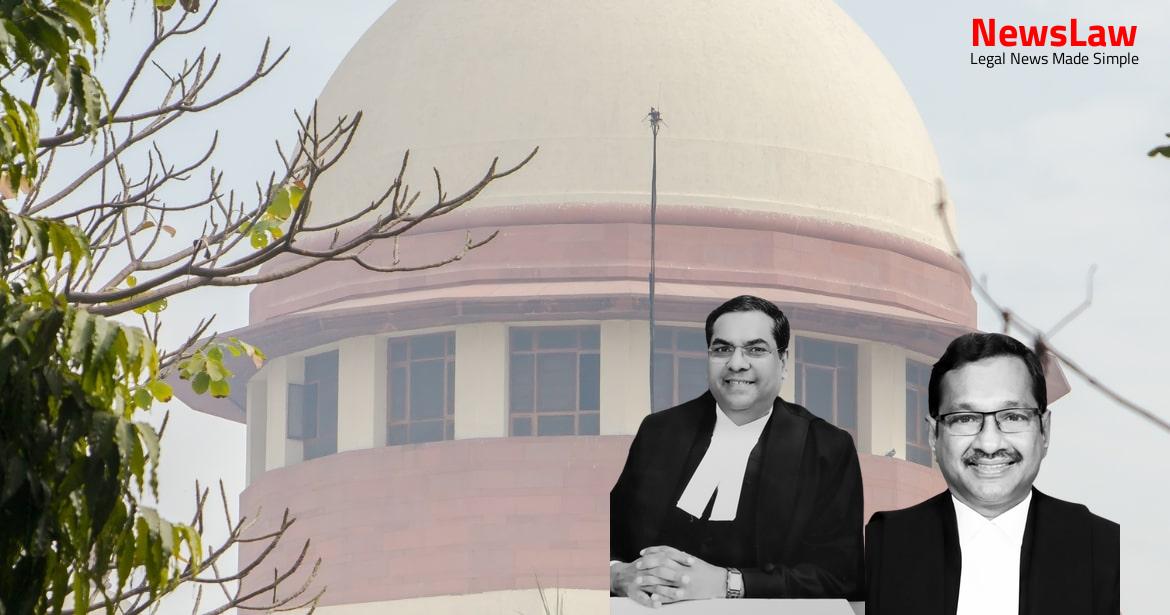In a significant ruling by the Supreme Court of India, a landmark decision has been made regarding pension qualification, specifically upholding the rights of work-charged employees. This ruling carries implications for employee benefits and financial security, setting a precedent in the legal landscape. Stay tuned for more insights into this pivotal case.
Facts
- The Full Bench decision allowed the review of the order dismissing Writ Petition No. 24 of 2007.
- The SLP against the Full Bench decision was dismissed as withdrawn.
- The State filed a Special Leave to Appeal which was also dismissed.
- The Court held that work-charged service should be counted for computing qualifying service for pension.
- The decision affirmed the High Court’s ruling in Kesar Singh v. State of Punjab.
- A Division Bench referred the matter.
- The High Court decided that work-charged service cannot be considered in qualifying service calculation.
- The Division Bench directed the Board to include work-charged service for pension qualification.
- The High Court relied on a circular dated 29.5.1992.
- The Full Bench of Uttarakhand High Court held that work-charged service cannot be included in qualifying service computation.
- The High Court dismissed the Full Bench decision.
- Narata Singh filed a writ petition in the High Court on 31.7.2008 to count his period in the work-charged establishment as qualifying service under the Rules of 1965.
- A representation was submitted as directed by the High Court, but it was rejected on 12.12.2008.
- The Single Judge dismissed the writ application, which was then appealed in a Letters Patent Appeal by Narata Singh.
- After being transferred multiple times, the Selection Committee recommended his services for regularization.
- Despite multiple rejections of representations, including one on 23.3.2009 and another on 16.11.2005, the appellant’s services were regularized on 13.3.2002.
- The Division Bench considered the documents and directed reconsideration of the matter, keeping the appeal pending.
- The case was remitted for consideration on the merits of the Contributory Provident Fund Scheme by this Court.
- The appellant cited the decision of this Court in Habib Khan vs State of Uttarakhand, where Regulation 370 was discussed in relation to Rule 3.17 (ii) of the Punjab Civil Services Rules.
Also Read: Urs Family Property Dispute: Supreme Court Decree
Arguments
- The counsel tried to justify the Government action based on Rule 1.4 of the Punjab Civil Services Rules, Vol. I.
- The petitioner had continuous service from 1951 to 1977 without any break, undermining the argument that the petitioner was a work-charged employee.
- The contention that work-charged employees cannot claim pension rights due to not being regularized against a post was presented.
- The comparison between regular, temporary, ad-hoc, and work-charged employees was made to establish distinctions in entitlements.
- The argument against treating work-charged employees the same as regular employees for ACP benefits was raised.
- The dismissal of a review application in a similar case was highlighted.
- A comparison was drawn between Rules and Regulations in Uttar Pradesh and Punjab regarding work-charged employees.
- It was emphasized that work-charged employees form a distinct class with differences in work pressure and accountability, justifying separate treatment.
- The conceptual difference between regular and work-charged employees was explained, highlighting the non-automatic entitlement to pension for work-charged employees.
- The argument that providing pension benefits to work-charged employees goes against the fundamental concept of pension meant for regular employees was presented.
- Pension can only be paid under specific rules.
- The decision in Kesar Chand is considered to be per incuriam.
- Citing the case Secretary, State of Karnataka v. Uma Devi & Ors. 2006 (4) SCC 1 as a reference.
- Mentioning that the economy of the State would collapse if work-charged period is considered as qualifying service for pension.
- Pointing out practical difficulties and financial burden on the State if the petitions are allowed.
Also Read: Promissory Estoppel and Public Interest: Union of India vs. M/s Dharampal Satyapal Ltd.
Analysis
- The part of the judgment discusses the concept of work-charged establishments and the employees working in such establishments.
- Work-charged establishment refers to an establishment where expenses, including wages, are chargeable to ‘works’.
- Employees in work-charged establishments are generally shown under a separate sub-head in the estimated cost of works.
- Work-charged employees are considered distinct from regular employees and have separate rules applicable to them.
- The nature of employment for work-charged employees is temporary, and their services end upon completion of the specific work or project.
- There is no automatic regularization for work-charged employees, and they do not have the same benefits as regular employees.
- Despite the temporary nature of their employment, services rendered by work-charged employees can sometimes be counted towards pensionable service.
- The rules governing work-charged employees may vary from state to state, and specific regulations need to be framed for their service conditions.
- Regularization of work-charged employees may not entitle them to seniority or other benefits as in the case of regular employees.
- The judgment cites various cases and rulings to highlight the distinctions between work-charged and regular employees.
- The Supreme Court has upheld the inclusion of work-charged service for qualifying service in certain cases, depending on the relevant rules and regulations.
- Continuous temporary or officiating service under the Government of Uttar Pradesh followed without interruption by confirmation in the same or any other post except specific cases.
- Periods of service in work-charged establishment and in posts paid from contingencies count as qualifying service.
- Workmen of registered State Workshops and Factories are entitled to facilities and concessions similar to those in factories under the Factories Act, 1948.
- Members of work-charged establishment are generally not entitled to pension or leave salary, except in certain cases.
- The qualifying service must be in accordance with Regulation 368 – holding a substantive post on a permanent establishment.
- Work-charged establishment refers to establishments employed on the actual execution of specific works or projects.
- A person’s service does not qualify for pension unless it meets three conditions: under Government, substantive, and permanent.
- The Government may determine the allocation of costs for work-charged establishment in consultation with the Accountant General.
- Specific rules and conditions apply to engage employees in work-charged establishments, including approval requirements and allowances for journeys.
- Qualifying service rendered in non-pensionable, work-charged, or contingency paid establishments can count towards pensionable service under certain circumstances.
- The submission that work-charged employees cannot claim regularization as a right was made.
- The Full Bench decision regarding the exclusion of work-charged service from qualifying for pension was challenged before the Court and dismissed.
- It was highlighted that work-charged employees, although denied certain benefits, are entitled to benefits under the Industrial Disputes Act.
- The Board’s scheme required completion of 9/16/23 years of regular service for promotional scales or increments, excluding work-charged service.
- The braiding of periods of temporary or temporary and permanent service as a pre-requisite for counting work-charged service was questioned as legally unsound.
- Issues of unjust deprivation of pensionary benefits towards work-charged employees post-regularization were emphasized.
- A specific settlement between work-charged employees and the management regarding regularization and service criteria was noted.
- Irregularities in the treatment of work-charged employees following project completion were brought to light, suggesting exploitative practices.
- The classification and treatment differentiation between work-charged and regular employees were criticized as arbitrary and discriminatory.
- The importance of specific rules governing the employment of work-charged employees to avoid doubts and confusion was stressed by the Court.
- Employees should not be regulated for regularisation if others have already been regularised
- The services of the employees in question should be treated as regular
Also Read: Jurisdictional Interpretation in Kamlesh Babu v. Lajpat Rai Sharma
Decision
- Rule 3(8) of the U.P. Retirement Benefits Rules, 1961 was read down to include services rendered in the work-charged establishment as qualifying service for pension.
- Arrears of pension limited to three years before the date of the order.
- Admissible benefits to be paid within three months.
- Appeals filed by the employees allowed, appeals filed by the State dismissed.
- All pending interlocutory applications and miscellaneous applications disposed of.
Case Title: PREM SINGH Vs. THE STATE OF UTTAR PRADESH SECRETARY
Case Number: C.A. No.-006798-006798 / 2019



